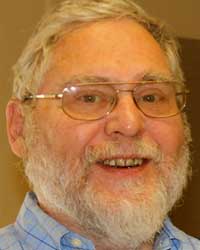 Henri Debruyne (1945-2020)
Henri Debruyne (1945-2020)
Born in Veurne (Belgium), January 14, 1945
First vows on September 8, 1965
Ordained a priest on February 13, 1971
Missionary in Congo, Cameroon, Rome, and Belgium.
Died in Brussels (Belgium) on April 9, 2020, at the age of 75.
I have known Henri for more than fifty years. And during these fifty years, our paths have crossed several times, until the day I took him to the Clinique St Jean for his last trip. When we arrived at the Coronavirus triage, his condition was critical. The nurses immediately brought a stretcher. While they were taking him away, he waved his hand at me again. That is how he took his leave of us.
I met Henri for the first time in 1967 at Jambes. We did theology together at the Major Seminary of Namur. From the beginning, he revealed himself to us as someone who knew how to make the most of his talents as well as his limitations. In fact, after a foot operation, he never practiced sports or physical exercise and remained rather sedentary all his life, but this did not prevent him from putting his talents at the service of the mission, especially in biblical teaching, secretarial work and financial administration.
Henri was a gifted confrere, gifted with languages and a lover of precision. He had a keen sense of synthesis. He was discreet, orderly and methodical, qualities which he was able to put to good use in his various functions. He also had a clear-cut character and did not fail to express his opinion when he disagreed or was upset. But under a sometimes-rough bark hid a welcoming and always available heart. In the seminary, Henri intrigued us, because he hardly took any notes; he often took care of everything else during the courses, which did not prevent him from following attentively what was said and from succeeding without any problem. Above all we had good teachers of exegesis whom Henri particularly appreciated: Canon Marcel Didier, our confreres Paul Van Parijs and André Boudart. These were by far the best courses. There is no doubt that his interest in Sacred Scripture was awakened during his years in the seminary. For the Word of God became the red thread of his life.
Henri twice pleasantly surprised me. The first time was at Jambes. I was then working as a student during the holidays in a hotel on the coast. The bosses had asked me if I could find someone I knew for a job at the hotel. I offered it to Henri without really believing it, and to my surprise he accepted and joined me. It was not really his style, but I understood that he was ready to get off the beaten track and take on unknown challenges.
The second time was in 1994. In Rome we were looking for a General Treasurer candidate. I immediately thought of Henri, although it was not easy. He had studied exegesis and taught at Ngoya. He loved to teach, and his lectures were appreciated by his students. But I was convinced that he was the best candidate and I offered him the task; I expected resistance and objections. To my great surprise, Henri accepted without hesitation. Who would have thought that exegesis and finance go hand in hand? In 1994 a change in his life occurred, which was unexpected, to say the least: from professor of exegesis, he became General Treasurer, a task that he assumed competently for 12 years. His mastery of languages, his methodical spirit, his sense of discretion and his participation in numerous Financial Committees had prepared him for this.In recent years, when serious health problems had made him less mobile, he continued to serve in the shadow of his desk, translating or correcting texts with an innate sense of precision no doubt sharpened during his studies of exegesis.We could also benefit from his introductory words and homilies at daily and Sunday masses. His comments were always based on a living knowledge of Sacred Scripture.
The last months of his life were marked by a serene struggle with a cancer that suddenly returned. Nevertheless, he continued to translate texts, a task he faithfully carried out until the day of his transfer to the hospital. Weakened by the fight against his cancer, he was swept away by the turmoil of the corona virus. Wherever Henri went, he left the memory of a confrere on whom one could count for a job well done. He was available to serve wherever he was needed. His discretion could also be counted on. He was concerned about seeing things done but did not boast about it. In other words, what one can expect from a good and faithful Scheutist. ■
by Jacques Thomas

